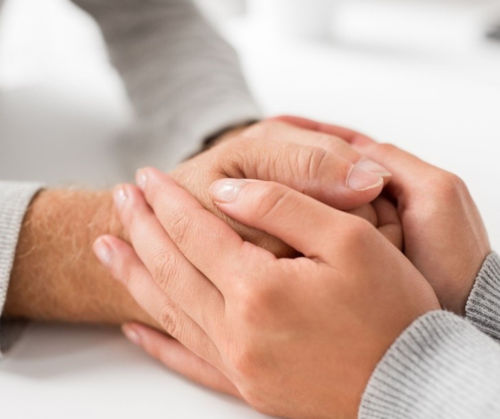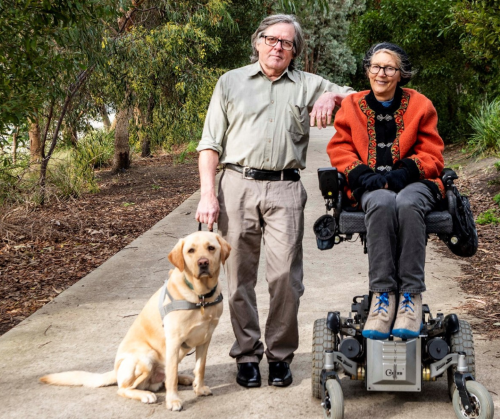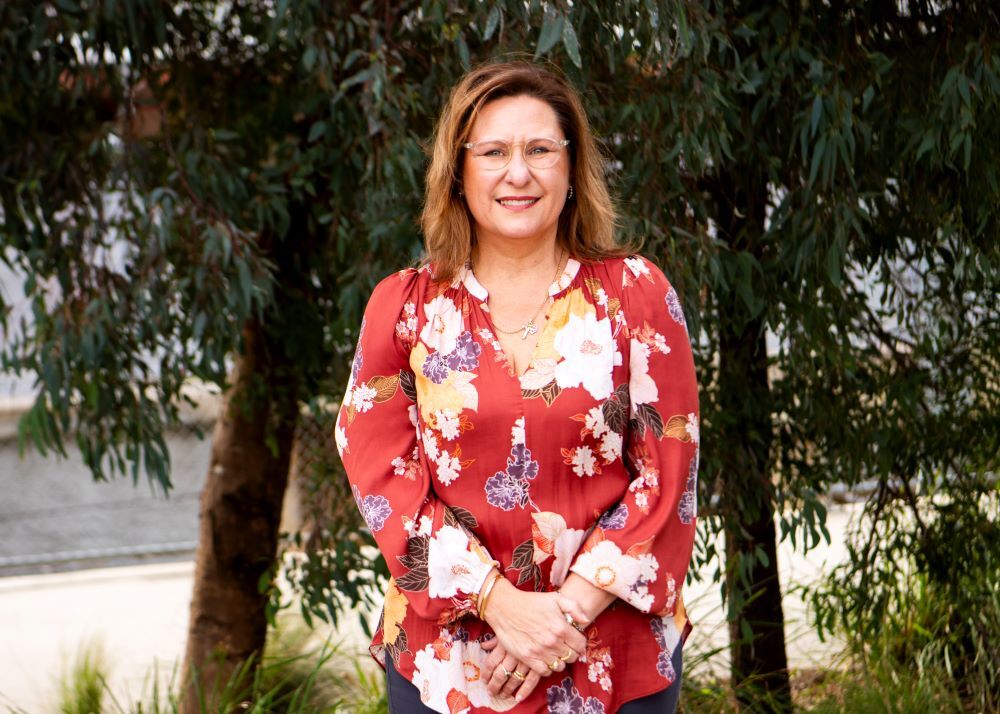On this page:
Meet Antony
Antony is the husband of Melita who lives with MS. They have 2 children together.
How do you relate to the term carer?
Initially I felt a bit weird about the term carer. That’s not the way it practically works with Melita and I, but it is something I’ve thought about. To me, it’s just part and parcel of what being a family member entails. We are just trying to incorporate it into our lives and understand what the other person is going through.
Can you share a bit about your journey with MS, how did it feel at the start?
When I was a kid, the only people I knew with MS had extreme mobility challenges, most were in wheelchairs. So, at initial diagnosis my immediate response was, ‘oh s**t, that’s where we’re headed’. The more we learnt about MS and how we can live with it and deal with it, the less catastrophic it became and it was no longer a daily concern. The shock of it was being presented with something that won’t go away, and that could progress however slowly or quickly into something extremely disabling. It still might, but the more that we’ve learned and spoken about it, about how to best live with it, including diet and exercise, through the support of the employment support team and PT, the easier it’s become.
What has it been like walking alongside your person living with MS?
In an odd kind of way, the diagnosis of MS has made us communicate better because we’ve been forced to. It has had to get better, clearer and more direct. For Melita it has been important to express what she needs, particularly when she’s fatigued. Rather than bottle it up and by osmosis for family members to just know. This was especially important early on with two really young kids, she’d have to say to me, I can’t have kids climbing all over me right now. And communicating that with the kids, too – it’s not that mum doesn’t love you, it’s that I’m not comfortable.
What kind of support has been helpful?
Since joining Peer Support as a volunteer, I’ve had some really honest and vulnerable peer support conversations while supporting people going through the same thing. Some of the younger husbands I spoke with reminded me of what it was like early on, and I remember wishing that that existed for me at the time. Education was helpful, but talking to someone else who gets it can’t be beat.
I’d also say that knowing that each of us could take some time for ourselves when it was needed, without the other feeling like it was being judged, has been really important. It probably wouldn’t have happened without communicating.
How has it impacted on your family as a whole?
It’s something our kids have always lived with. It’s really the fatigue and brain fog that affects Melita the most, so it’s not so visible to the kids a lot of the time – it’s why we call it an invisible illness. It mainly comes up when they want to do something big, and she has to say no, because she knows if she overdoes it, she’ll be fatigued for a couple of days. They mostly get it, they deal with it like teenagers do.
You don’t get it right every time, but by and large it is something we manage.
Meet Amy*
Amy is the wife of a person living with MS, and mother of their 3 young children.
How do you relate to the term carer?
When I think of a carer I think of an older person in a wheelchair who needs a lot of assistance. While this may be some people’s experience – I’m a wife and a mother – and the ups and the downs, they come along with it. When your spouse is sick, you’re going to get them the medicine they need, or the food they need. So, for the most part I don’t really relate to the term carer in the way people usually think about it. But on the days when my husband is struggling – when he’s fatiguing and he needs to lie down, the burden of the house and the kids falls on me. I think this is why at times, I have felt a bit like an imposter attending a group with other carers, whose role may look very different to mine.
What has it been like walking alongside your person living with MS?
It's very strange, because you know you’re going to go through something together, but you’re not actually going through it first-hand.
I needed to be there for him, help him process his emotions, while also in my private time, processing my own. You don’t want to make it about yourself, but the reality is, you’re going through your own journey too.
What kind of support has been helpful?
It's tricky, because when I’m with my husband, I feel that it’s not my story to tell. But having people to talk to, that could have told me – you’re going to be ok, your life will be ok – especially in the first few weeks, that would have been helpful.
Have you sought support for yourself?
I remember seeing a psychologist at the time from work, but with the beginning of the pandemic and one of our children going through a hard time in addition to the MS diagnosis, there were more pressing things I needed to tend to. I was in survival mode.
Can you share a bit about your journey with MS?
At first it was very scary. We were asking ourselves; what does this mean? What kind of supports will be required? Am I going to be pushing a wheelchair? What will our life look like in the next 2, 5, 20 years? The only other person I knew was my friend’s mother who had a lot of bad days.
As time progresses, you realise that it’s manageable. On a day-to-day basis, the anxiety fades even though it’s always going to be there. Then, he’ll stumble on his words or drop something, and I’ll be reminded that it’s still very much a part of our lives, but there isn’t that same level of anxiety.
*Amy is a pseudonym to protect the author’s anonymity
Meet Phred
Phred is the partner of L.E. who lives with MS.
Can you share an insight from your carer journey?
Every day that we finish safe and happy is a small victory.
How have you navigated finding support for yourself as a carer?
We are lucky-- to this point I haven't needed to ask for a lot of outside support. In our case, NDIS has been a great help. I know others may have different experiences.
What are some of the things you do to take care of yourself?
I rumble around in my woodshop, making bowls, pens, boxes, and other small things. And sometimes I just make piles of sawdust, or "bespoke firewood". Either way, it makes me happy.
When you first became a carer, what are some things you wished someone had told you?
- Understand that while every case is different in the details, each is quite likely similar in the impact this has on both of your lives. You are no longer playing to win-- the aim is to more or less to breakeven and not let this drag you into a dark place. This might sound cynical, but nature and biology will always win in the end, so just do your best to roll with it where you can.
- Read "The Selfish Pig's Guide to Caring" by Hugh Marriott.
- Accept that everyday things will take longer than you might like. And longer as time goes by...... I still struggle a bit with this.
- Find a good friend (in a similar situation) that you can talk to regularly and candidly. You need a space to say things that some people (who have no real carer experience) might find a bit selfish or hard-hearted, and to someone who can listen with empathy rather than judgement. I personally find this more valuable than organized support groups.
Meet Malinda
Malinda is the mother of her 21-year-old daughter who lives with MS.
Can you share a part of your carer journey that is particularly meaningful to you?
Advocating for my child with MS has been the most challenging yet rewarding part of my carer journey. The realisation that my child knows her body best and her symptoms should not be dismissed by the professionals, has led to me being her voice and inspiring her to advocate for herself. If in doubt, get a second or third opinion.
How have you navigated finding support for yourself as a carer?
I am fortunate that I have family and friends that support me with regular check-ins. It was difficult at the beginning when my daughter was diagnosed as my loved ones didn’t know what to say/ask so they withdrew. While hard to speak up, I found having the difficult conversation upfront about how my family and friends could support me was very beneficial, so everyone understood the expectations. Peer support through MS Plus was a great way to meet other parents of teens with MS and talk to others who understand.
What are some of the things you do to take care of yourself?
Self-care is critical and some regular respite from the caring responsibilities is necessary to endure the journey long term. I take care of myself by regularly catching up with family members and friends that fill my soul and make me happy. I love nature so walks near the river or beach re-energize me and give me respite from the mental load that caring entails.
When you first became a carer, what are some things you wished someone had told you?
- Contact MS Plus soon after diagnosis to obtain information, support and advice on how to communicate with school, work, family and friends. The MS nurse provided invaluable information on treatments and advice on what symptoms require urgent attention vs sit and wait approach.
- Establish the support network for your child early after diagnosis even if not immediately required. This includes mental health support, occupational therapy, physiotherapist, MS nurse, pharmacist, medical specialists, and GP. Use providers that have expertise with MS as it makes a difference to the level of empathy and understanding they have dealing with the unpredictability MS brings. Using an organisation that provides access to multidisciplinary supports is highly advantageous. Having doctors/specialists within one hospital is very beneficial.
- Use MS Plus to assist with accessing NDIS and use their support coordinators. Their insight into what supports assist MS related disabilities is very advantageous.



